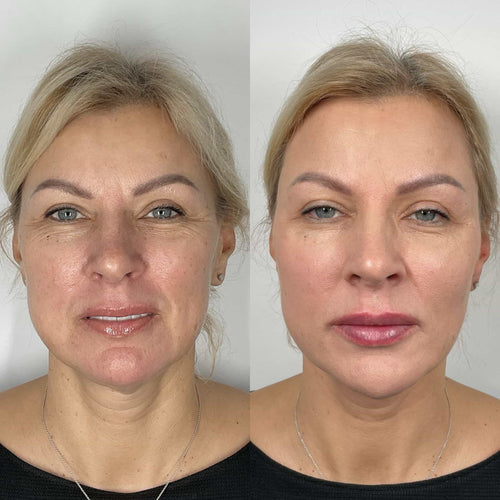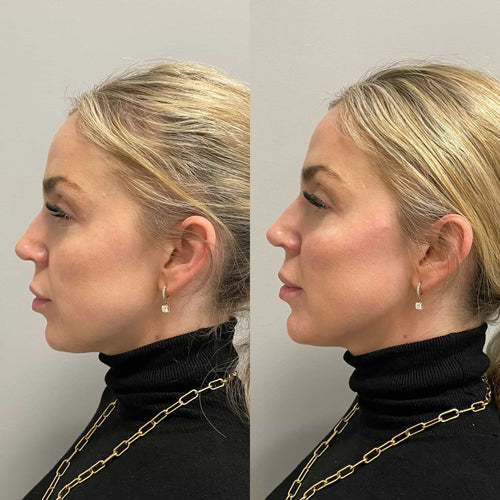Reserve Your Dermal Filler Consultation with Dr. Laura Geige
## Factors to Consider
When considering tear trough filler, several factors beyond age play a crucial role in determining if it’s the right choice and at what point it might be appropriate.

Here are some key considerations:
-
Skin Elasticity and Thickness: Younger individuals with naturally elastic skin may experience better long-lasting results. As we age, skin loses elasticity, potentially leading to filler settling or migration over time.
-
Under-Eye Hollows Severity: Mild undereye hollows may benefit from a subtler approach, while more pronounced hollowness might require a higher volume of filler.
-
Facial Structure and Symmetry:** A balanced facial structure is essential for optimal results. Significant asymmetries may need to be addressed before tear trough filler, potentially through other procedures or techniques.
-
Medical History and Allergies: Any pre-existing medical conditions, allergies, or medications can influence filler suitability and potential complications.
-
Lifestyle Factors:** Sun exposure, smoking, and certain skin conditions can impact the longevity of filler results and should be discussed with your practitioner.

It’s important to consult with a qualified and experienced injector who can thoroughly assess your individual needs, discuss realistic expectations, and recommend the most appropriate course of treatment.
Remember, the “best” age for tear trough filler is highly individualized.
Age Isn’t Everything
Under Eye Anatomy and Volume Loss
Genetics and Lifestyle
## The Consultation Process
Genetic predisposition plays a significant role in facial aging, including the development of tear troughs. Individuals with thinner skin, naturally prominent cheekbones, or inherited features that create more pronounced shadows under the eyes may be more susceptible to tear trough deepening as they age.
Lifestyle factors can also contribute to the appearance of tear troughs. Sun exposure, smoking, alcohol consumption, and poor sleep habits can all damage collagen and elastin fibers, leading to skin laxity and sagging in the delicate under-eye area.
A thorough consultation with a qualified aesthetic practitioner is essential to determine if tear trough filler is appropriate and to develop a personalized treatment plan.
During the consultation, the practitioner will take a detailed medical history, including any medications or allergies. They will also assess your skin type, facial structure, and desired outcomes. It’s important to be open and honest about your expectations, concerns, and lifestyle habits.
The practitioner will examine the tear trough area, evaluating the severity of the under-eye hollowing, skin thickness, and surrounding bone structure. They may also use photographs to document your current appearance and track progress over time.
Based on the assessment, the practitioner will discuss various treatment options and explain the potential benefits, risks, and downtime associated with each.
Tear trough filler is a non-surgical procedure that uses hyaluronic acid gel to add volume to the under-eye area and smooth out wrinkles. The practitioner will inject the filler strategically to restore contour and create a more youthful appearance.
The consultation process also provides an opportunity to ask any questions you may have about the procedure, recovery, and aftercare instructions. It is essential to feel comfortable and confident in your choice of practitioner before proceeding with any treatment.
Reserve Your Dermal Filler Consultation with Dr. Laura Geige at It’s Me and You Clinic
Understanding Your Goals
Evaluating Facial Structure
Assessing Skin Health and Elasticity
## Beyond Aesthetics:
Assessing skin health and elasticity is crucial for determining the best course of action regarding cosmetic procedures like tear trough filler.
Skin quality goes beyond just appearance; it’s a reflection of overall health and well-being. Factors influencing skin elasticity include genetics, lifestyle, environmental exposure, and hormonal changes.
Age** is a significant factor, as collagen and elastin production naturally decline with time, leading to thinner, more fragile skin.
Beyond age, several key characteristics indicate skin health suitable for filler treatment:
• **Hydration:** Well-hydrated skin bounces back better and absorbs fillers effectively.
• Thickness: Thinner skin may not provide adequate support for filler, leading to visible lumps or irregularities.
• **Tone and Texture**: Healthy skin has a smooth, even tone. Excessive sun damage, scarring, or hyperpigmentation can affect filler placement and results.
• **Presence of Wrinkles:** Deep set wrinkles around the tear troughs may benefit from filler for volumization.
A qualified aesthetic professional will assess these factors during a consultation, including examining your medical history and discussing your desired outcome.
Consult with Dr. Laura Geige for Dermal Fillers Now
Remember, *treating skin health is an ongoing process*, not just about a single procedure. A comprehensive approach involving skincare routines, sun protection, and healthy lifestyle choices contributes to long-lasting results.
Potential Risks and Side Effects
Long-Term Maintenance and Touch-Ups
Alternatives to Tear Trough Filler
Bend and Blossom Decléor Direct Aron Marquez Pinnacle Wellbeing Media The CBD Consultancy
- Traptox Aka Trapezius Botox Treatment Near Horne, Surrey - January 1, 2025
- What Age Should You Get Tear Trough Filler? - December 20, 2024
- When Lip Filler Migrates - December 13, 2024
